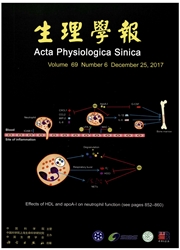

 中文摘要:
中文摘要:
本研究采用缺氧、血清饥饿(hypoxia and serum deprivation,H/SD)联合处理骨髓间充质干细胞(mesenchymal stem cells,MSCs),模拟MSCs移植的心脏缺血微环境,研究蛋白酶体抑制剂MG-132对H/SD诱导的MSCs凋亡和旁分泌的影响。采用Annexin V/PI流式细胞术检测细胞凋亡,real-time PCR检测白介素-1β(IL-1β)、肿瘤坏死因子-α(TNF-α)和白介素-10(IL-10)mRNA表达,免疫荧光染色检测NF-κBp65细胞核转位,Western blot检测IL-1β和TNF-α蛋白表达,ELISA检测IL-10细胞分泌。结果显示,MG-132能够抑制H/SD诱导的MSCs凋亡,并通过抑制NF-κBp65细胞核转位抑制IL-1β和TNF-αmRNA转录;MG-132能够明显增强H/SD诱导的IL-10mRNA转录和IL-10分泌。上述结果提示,MG-132能够抑制缺血诱导的MSCs凋亡和炎症因子IL-1β和TNF-α表达,增强抗炎症因子IL-10的分泌。MG-132预处理有可能成为提高MSCs移植存活率、增强MSCs旁分泌效应的有效策略。
 英文摘要:
英文摘要:
Bone marrow-derived mesenchymal stem cells (MSCs) have emerged as attractive candidates for cellular therapies for heart and other organ-system disorders. However, a major dilemma in stem cell therapy for ischemic heart diseases is the low survival of transplanted cells in the ischemic and peri-infarcted region. In this study, MSCs were treated by hypoxia and serum deprivation (H/ SD) to mimic the ischemic microenvironment of infarcted hearts where MSCs were transplanted. The effects of proteasome inhibitor MG-132 on H/SD-induced apoptosis and paracrine effects were investigated. Apoptosis of MSCs was detected by Annexin V-FITC flow cytometric analysis. Transcriptional levels of IL-1β, TNF-a and IL-10 were examined by real-time PCR. The nuclear translocation of NF-r, Bp65 was assessed by immunocytochemical staining. Translational changes of IL-1β and TNF-a were detected by West- ern blot. The secretion of IL-10 from MSCs was examined by ELISA assay. The results showed that MG-132 could effectively sup- press H/SD-induced MSCs apoptosis. Furthermore, the induced IL-113 and TNF-a transcription was also inhibited by MG-132 treatment, which may be due to the inhibition of NF-kBp65 nuclear translocation by MG-132. Importantly, MG-132 effectively enhanced H/SD-induced transcription and secretion of IL-10, which is an important paracrine factor from MSCs. Our findings suggest that pretreatment of MSCs by MG-132 before cell transplantation may be an effective strategy to improve cell survival and enhance paracrine effects of MSCs.
 同期刊论文项目
同期刊论文项目
 同项目期刊论文
同项目期刊论文
 期刊信息
期刊信息
